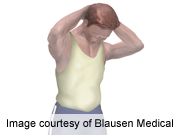
FRIDAY, March 9 (HealthDay News) — The first gene linked to an often painful neck disorder has been identified by researchers.
Adult-onset primary cervical dystonia, which is characterized by involuntary twisting of the neck, occurs in about 30 of every 100,000 people, previous research has reported.
In this new study, researchers conducted a genetic analysis of a patient with the condition, his identical twin whose neck also twisted and family members, some of whom also had the disorder. The investigators pinpointed a mutation in the CIZ1 gene, which produces a protein expressed in certain nerve cells in the brain and appears to be involved in cell cycle activities.
However, the researchers did not identify the cellular mechanism associated with cervical dystonia.
The study findings were released online in advance of publication in an upcoming print issue of the Annals of Neurology.
While the researchers believe that CIZ1 is one genetic cause of the disorder, it’s likely that other genes linked to cervical dystonia will be found, according to Dr. Ryan Uitti, a neurologist at the Mayo Clinic in Jacksonville, Fla.
There are a number of treatments for cervical dystonia. The most common is botulinum toxin injections, which incapacitate the nerve in the affected muscle and eliminate chronic pain and muscle pulling/contraction.
But some people with the condition don’t realize that it is unusual and that they should seek medical help, Uitti noted.
“They think they slept wrong at some point, or, because the twisting might straighten out with another maneuver, such as walking backwards, they might actually [not be taken seriously],” Uitti said in a Mayo Clinic news release.
More information
We Move has more about cervical dystonia.

